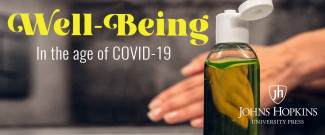
Johns Hopkins UniversityEst. 1876
America’s First Research University
Now Browsing:
How to Successfully Share Coronavirus Information with an Individual with Dementia Symptoms


By Laura Wayman
Whether you are a family caregiver or a professional care provider, it is important to remain adaptable with your care approach to successfully manage dementia symptoms and behaviors. A caregiver who is “dementia-aware” is one who remains open to continuing education.
Now, in the midst of this coronavirus crisis and all of the challenges it brings to you the caregiver, more than ever this is a time to help the one(s) being cared for by using dementia-aware communication strategies, remaining sensitive to the fact that all of the emotions and feelings remain. Dementia-aware communication has less to do with your words than it has to do with the feelings you project.
Let’s first transform our perception of dementia and why it is necessary to change our communication and approach to better connect with the individual with dementia symptoms. Dementia is not a specific disease. It's an overall term that describes a group of symptoms associated with a decline in thinking skills severe enough to reduce a person's ability to perform everyday activities. What is behind these dementia symptoms? Our brains are always trying to make sense of things, to impose order on all the information we are continuously taking in. But when an individual has dementia symptoms, whole experiences are constantly being lost, making it difficult for the brain to get its bearings. Through sight, hearing, touch, smell, and taste we take note of things outside of ourselves. Then our brains make sense out of what we take in. People with dementia begin to struggle sensing and interpreting things, and this is especially challenging if they become overwhelmed with too much information.
In plain language, the essential parts of the brain we access to understand the world around us—every piece of data we receive, process, and use to do anything—is now broken, and with most cases may continue to become even more broken over time. The way I like to describe it is: the person presenting dementia symptoms is a “broken thinker.” And to become “dementia-aware” is to learn to “think” for them.
Below are some dementia-aware communication tips to help the family and professional caregiver share necessary information about the coronavirus threat in a more positive dementia-aware way without causing undue anxiety:
Provide just enough information
Try to strike a balance between answering questions without fueling the flame of anxiety and avoid providing too much information that may create extra alarm. Among the greatest challenges is how to minimize overstimulation, keeping in mind it is all about how information makes them feel. Leave out specific details and join them in whatever they might be feeling – give them only the information they can process and handle in the moment.
This is a big change in how we have always communicated with adults, so it takes practice! I even have to remind myself to ask less and do more, as this is a core component of dementia-aware communication. A dementia-aware caregiver uses fewer questions, gives fewer options, and uses positive action, keeping all statements simple.

Model calmness
Even though you may be concerned yourself, it is important to model calmness. A flight attendant that appears terrified may make you think there is something wrong and you should worry. If that same flight attendant calmly offers you a beverage with a smile, you might think there’s just windy weather that will pass soon.
Limit news and media exposure
Although the news can be helpful by keeping everyone informed, news stories often use wording that is strong and scary – and the reporters don’t practice dementia-aware positive engagement. Limit news-viewing to the hours after the person you are caring for has gone to sleep, read the news independently, focusing less on the threat. Take time to reframe information into news that will not push them into anxiety or fright. Join their feelings and help them to feel loved, safe, secure, comfortable, and valued by practicing positive action statements such as: “This is a scary time for everyone, I am sure glad we can get through this together,” “I listened to the news this morning and it sounds like there are very smart doctors and leaders that are making good decisions to keep us all safe.”
Watch for reassurance seeking
It’s natural for the person you are caring for with dementia to ask questions repeatedly, particularly about something difficult for them to understand and process. Often, however, for those with dementia symptoms, it is the underlying feeling of anxiety causing the individual to continually ask the questions rather than actually seeking an answer, prompting a behavior called reassurance seeking. It may look like the person with dementia is repeatedly asking the same or similar questions, yet the person’s distress increases no matter how many times you give them the answer. If you notice repeated reassurance seeking, change from answering the question to talking to the feelings. If the person you are caring for asks you repetitively why they can’t go to their favorite restaurant for lunch and seems anxious when you explain that the restaurant is closed due to the coronavirus quarantine, try the strategy of talking to the feelings instead of answering with details. For example, say and “do” the following (join the feelings and take positive action): “I miss going to our favorite lunch spot as well, I love having lunch with you, let’s make our favorite grilled cheese sandwich and have lunch together at home.” Then just move forward and get it done!
The more you “think” for people with dementia, using these strategies, the kinder and more supportive you are in their eyes. Short and sweet, less is best, fewer words and more action. This change in your care approach as you become more dementia-aware brings relief, and helps both of you experience more moments of calmness and peace.
Dementia-awareness offers caregivers helpful communication techniques such as positive action statements and care approach strategies for managing and easing dementia care challenges. For more information, tools, and training for becoming dementia-aware visit my website www.laurawayman.com.
Laura Wayman holds an associate in arts degree in gerontology and is a certified Social Services Designee. She has over a decade of experience in and a strong dedication to quality aging. She is a professional dementia care consultant; the CEO of The Dementia Whisperers; and a sought-after speaker on dementia and issues of aging. Wayman is the author of A Loving Approach to Dementia Care: Making Meaningful Connections with the Person Who Has Alzheimer's Disease or Other Dementia or Memory Loss.
Login to View & Leave Comments
Login to View & Leave Comments


